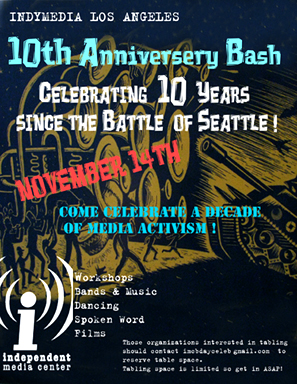In November of 1999 there was little awareness in the United States of the social, economic and environmental havoc caused by the WTO’s undemocratic global trade decisions. There was great awareness in other parts of the world, however, where indigenous groups such as the Zapatistas in Southern Mexico were being impacted greatly, and farmers and whole communities around the world were resisting.
These decisions, made by a handful of corporate elites, in step with Neo-Liberal policies, were designed to benefit only the top players, and were often adopted globally as official policy.
Some of the people here who were starting to feel and understand the pinch were laborers and farmers. So when the WTO made the announcement that they would hold their 1999 Summit in Seattle, Washington, these groups joined forces with the fledgling anti-globalization movement in this country to demonstrate and attempt to prevent the meetings.
From the onset, the idea was to begin, in a positive way, to move towards the ideal alternative world; a world in which decisions would be made horizontally by consensus, and in which people would move in small democratic affinity groups. This democratic urban-guerilla demonstration technique, borrowed from the Spanish Anarchists, would later confuse the hell out of the Seattle police who searched in vain for leaders.
A group of self-named “Media-Activists” in Seattle who were there to observe the organizing, feared that the corporate media would ignore or in a worst case scenario, demonize the protests, decided to form a media-collective called the Independent Media Center. This collective would cover the protests, and utilize the Internet in a new way. They would use software developed by Community Activist Technology (CAT) out of Australia that would allow everyone to participate in media creation, post their articles and comments, and publish their video and audio. Media production and consumption was no longer a one way corporate highway. It was the first stake in the heart of the capitalist domination of the media system!
This would be done collectively and in solidarity with the protestors, using the same principles of organizing; a modern fusion of classic Anarchism, mixed with Indigenous Zapatismo and principles of Democratic-Socialism.
Of course all of this took months of training and organizing. A call went out for volunteers, donations were sought, a storefront was rented and filled with computer and video-editing equipment, and when the WTO protests began in November 1999, the Seattle IMC opened its doors to the world. The corporate press had no idea what just hit them!
The 1999 WTO protests, known as the “Battle of Seattle”, marked the beginning of the U.S involvement in the Anti-Globalization movement; and Indymedia is what linked this country with the global movement. This was an exciting moment for people who had been searching for just this kind of tool….and the possibilities were tremendous!
IMC collectives almost immediately began forming all over the world. In Los Angeles, A group of Media-Activists who had already been meeting, some of whom had been in Seattle, started organizing to create an IMC to cover the 2000 DNC which would be held in Los Angeles.
Starting with a small group, ranging from six to ten people, the weekly organizing meetings grew until the event itself, where there were 1800 volunteers in the streets wearing LA IMC badges. The entire 6th Floor of a building near the Staple Center where the DNC would be meeting in LA was rented. The affinity groups, along with the Web group (later dubbed “Webitorial”), included Video, Audio (pirate radio), and Photography. The “Los Angeles Free Press” provided a daily print newspaper which was distributed on the streets, and “Democracy Now” had a space to broadcast on Pacifica during the week. Since digital photography was not yet in the offing, for security purposes there was a bicycle affinity group designated to take the film outside of the area every night to be processed. Almost every detail was covered. A water filter company provided good water to the collective and local farmers brought in produce.
The space was a 24 hour hub of activity, and a life changing experience for many of the people involved.
10 years later, Indymedia remains viable and relevant. Hundreds of IMC collectives have begun around the world; some more successful than others, all under the banner of the original Mission to “Use Media Production and Distribution as a Tool for Promoting Social and Economic Justice.” Some Indymedia centers have adjusted to the needs of their communities, and some have come under serious scrutiny in places where outright repression of independent media sources is common. We’ve had both deaths in our ranks, and great successes; and in many cases we’ve served as a link between communities to build and to create movement.
The LA Indymedia collective is making a call-out to the community and to all other Indymedia collectives to come together on November 14th, 2009, at the TOW Art space near Downtown LA, located at 1450 E. 6th St., L.A., 90021, to commemorate, to share, and to discuss ways to move forward.
There will be workshops, lectures, film, food and live music, from noon until……
There will also be an Indymedia discussion circle. This space, in which community members are invited to participate, will be a place for members of different Indymedias to share ideas, compare notes about how their various collectives have evolved, ways of reaching out to the community, technologies, etc….
In Solidarity,
The LA Indymedia Collective
Contacts:
General questions:
info@la.indymedia.org Housing:
imcla-crash@gmail.com Tabling:
imcbdayceleb@gmail.com 
